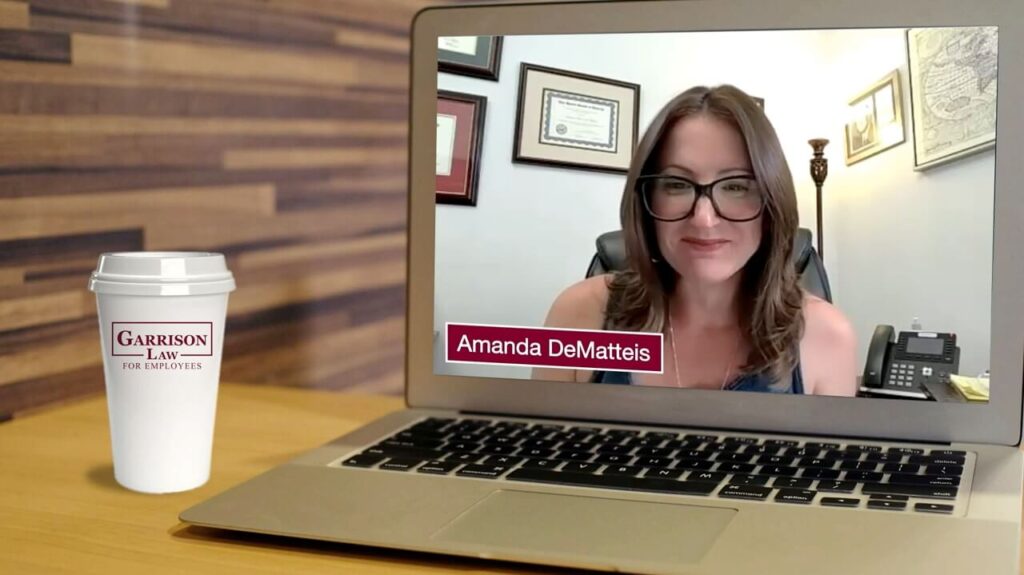Sep 6 2023
Josh Goodbaum: Hi, Amanda.
Amanda DeMatteis: Hey, Josh. What are we going to chat about today?
Goodbaum: I want to talk about the FMLA — an important topic in employment law — and in particular, about an employee who is out on FMLA, has Family and Medical Leave Act leave, and finds another job. And then that employees wants to quit their job and go take that other job while they’re still on FMLA. Can they do that?
DeMatteis: Easy answer: Yes, they can, as long as they do not have an employment contract in place that dictates the length of their employment, the term of their employment, or what have you. Otherwise, without an employment contract, you are an employee at-will, and you can end your employment relationship with your employer any time you want for whatever reason you want.
So, if you were out on FMLA and, while you were out, you decided to look for another job and found something that may be better suited for you, there’s nothing prohibiting you from giving your notice to your employer and moving on to a subsequent employer and starting over as you see fit.
Goodbaum: Okay. But what if my old employer says, “Hey, wait a minute, you told us you needed to be on FMLA because you couldn’t work, and now it turns out you can work. In fact, you’re taking another job.” Isn’t that FMLA fraud? Do employees need to be concerned about that?
DeMatteis: We always want to be concerned about FMLA fraud because, certainly, we don’t want to see any Connecticut employees being accused of fraudulent activity as it relates to the FMLA. Not a good thing, right? But in this particular circumstance, this isn’t FMLA fraud at all.
Remember, you can take FMLA for your own serious health condition. You can also take FMLA for the serious health condition of an immediate family member. So in that instance, you’d be completely capable of performing the essential functions of your job and working. But at the current time, there may be a family member that you’re caring for and your time is better served caring for that family member than it is going to work.
So when you’re out on FMLA, what you’re saying is not “I cannot perform my job,” right? That’s not one of the things that’s required to take FMLA leave. To take FMLA leave, you or your family member just need to have a serious health condition; it doesn’t need to prohibit you from working. Maybe you have FMLA because you have a 50 lb. lifting restriction, and you’re a nurse and you need to be able to move patients. Well, you could perform a job function, but you can’t lift 50 lbs. and you have to lift 50 lbs. to perform your job as a nurse, right? I could give you countless examples of this.
So if the new job also requires you to lift 50 lbs., then you might have some difficulty, right? Because it would then appear like, “Well, wait a minute. When you were working for Employer A, you couldn’t lift 50 lbs. Therefore, you were out on FMLA. Now, all of a sudden, you’re going to work for Employer B with that same 50 lb. lifting restriction, but you’d be required to lift 50 lbs. there. Why could you do it for Employer B when you couldn’t do it for Employer A?” And that’s a reasonable question.
So you always want to make sure you’re not doing anything that violates the restrictions that your doctor has put in place, right? Anything that your employer has relied upon to grant your FMLA – you want to make sure you’re abiding by that, and you’re following it to a T. As long as you’re doing that, otherwise, you can do whatever you’d like.
Goodbaum: Thanks for that guidance, Amanda. Really great. And thank you all for watching. We’ll see you soon.
Posted by Garrison, Levin-Epstein, Fitzgerald & Pirrotti, P.C. in Commentary
Tagged Amanda DeMatteis, FMLA, Joshua Goodbaum









